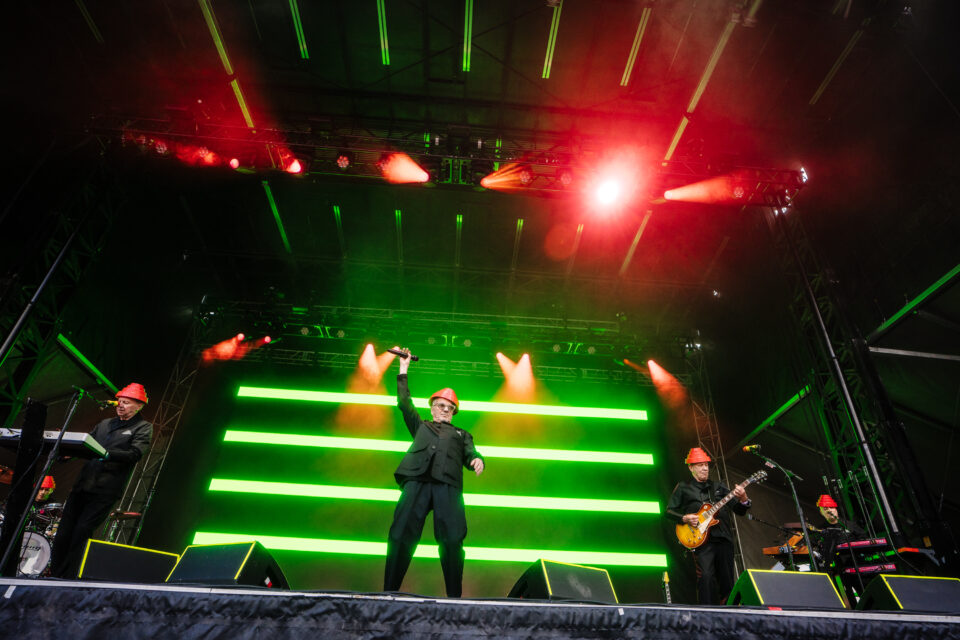Kent, Ohio group DEVO, short for The Devo-lution Band, made a splash in the late ’70s and charted beginning with 1980’s “Whip It” for blending electronic synthesizer sounds with punk vocals and angular guitars. The sound was freshly branded as New Wave, and DEVO comes up immediately when mining this sub-genre of rock music, especially for American acts.
Just don’t call the music “quirky” in the presence of the band’s co-founder Mark Mothersbaugh, who derided this descriptor as “a way to diminish something that you didn’t understand.” He countered, “I thought DEVO was not really quirky at all. I thought we were super cool and I thought that we were putting content back into art and music with what we were doing.“
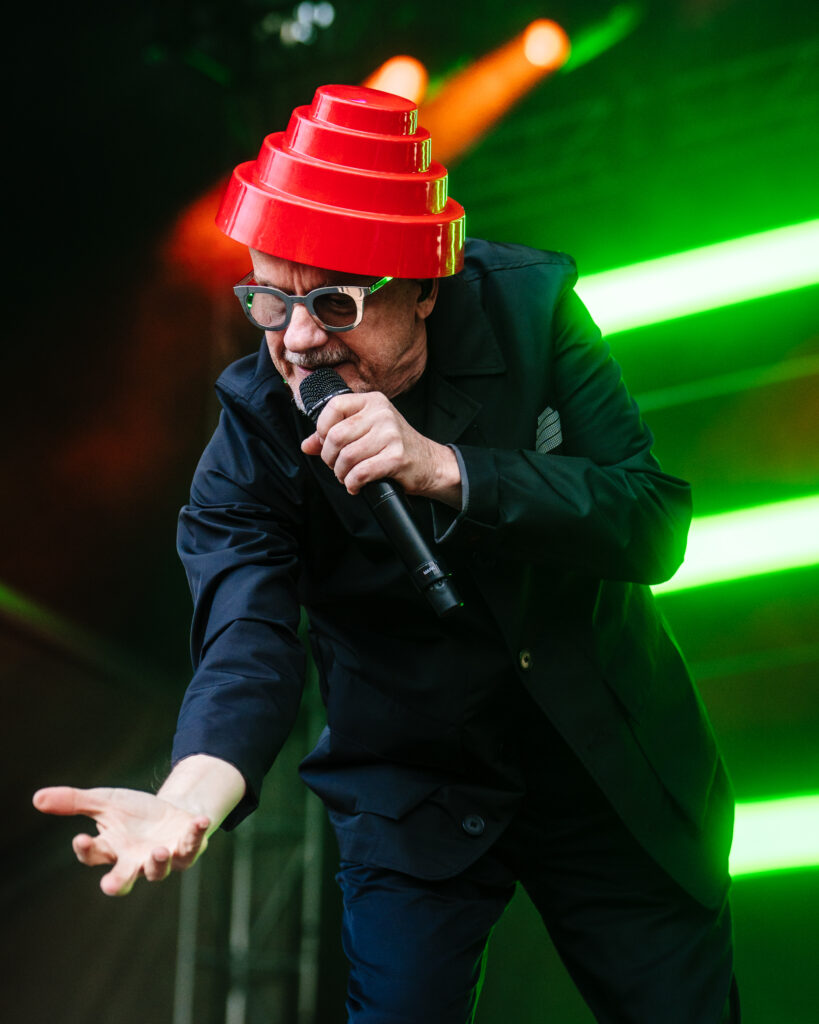
And they’ve been doing that, pushing social and eco-consciousness in their music while remaining sonically groundbreaking and playful in performance, for more than 50 years. DEVO continues a “farewell” tour this year into newly announced dates alongside another celebrated band with decades under their belts, and one no doubt occasionally dubbed quirky, The B-52s. Their documentary, called simply DEVO, which premiered at Sundance last year, will be streaming on Netflix August 19.
Playing on the first night of an expanded, four-day Kilby Block Party festival in Salt Lake City in May, DEVO brought the energy, and gleaned the crowd response, warranted for the band’s half-century making music. I caught up with Mothersbaugh just before he transported to festival grounds and we discussed the band’s origin, its message and how he sees technology interacting with art of all kinds.
This multi-hyphenate turned 75 just a couple of days after we spoke in Utah. Simultaneous with the DEVO tour, Mothersbaugh owns a gallery space in LA with an exhibit of his visual art currently opened to the public. His credits as a musical composer for film and TV range from family favorites “Pee Wee’s Playhouse,” “Yo Gabba Gabba!” and the “Rugrats” cartoon (I quickly aged myself in citing this show) to cult classic indies by Wes Anderson (“The Royal Tenenbaums,” “The Life Aquatic,” etc.) to blockbuster hits like “Thor: Ragnarok,” “Stranger Things” and “The LEGO® Movie.”
This person could not have been more causal considering how very influential his voice and his pen have been to numerous generations. Hear Mark Mothersbaugh On The Record with WNXP in full here or via the WNXP Podcasts channel. Enjoy selections from the interview, below.
“Mutate, don’t stagnate”
Celia Gregory: I’m finding you at the tail end of a pretty extended farewell tour, you’ve been celebrating 50 years of Devo-lution. I want to know at this point, tour wrapping up finally this year, how you’re feeling about it and why is it time.
Mark Mothersbaugh: Well, we’re calling it wrapping it up, but we’re just wrapping up phase one. The first 50 years I think DEVO was identifying and helping people think of humans as maybe the one species out of touch with nature, maybe the ones species at odds with the planet. Especially because of how things have changed with technology and it’s given us all these things like phones and microphones, that who knows where they come from and where they’re going. [Points to my handheld microphone.] That’s got a recorder in it, doesn’t it? That is incredible. Everybody’s been overwhelmed by technology in a way, you know, and I don’t mean just old people, I mean young people, too. It’s like we all get overwhelmed by all this stuff and we get all this information, a lot of it’s fake or a lot of it’s misdirection and a lot of it’s real. And people become frozen. They don’t know how to deal with it.
And I I think the next 50 years of DEVO — let’s see, between now and 2075 — DEVO is about mutate, don’t stagnate. Meaning, there’s all this wonderful stuff out there. It’s so great. I would like to talk to people and say, “Don’t let it overwhelm you. Look at how great it is.”…There are so many great opportunities out there for people if they just look at it the right way, you know? If you just see through all of the clutter. I think it’s just a wonderful time to be an artist, somebody that’s just starting.
DEVO’s deviation from the norm and continuation of message
MM: Jerry [DEVO co-founder Gerald Casale] and I first met in ’69 and then ’70. We first wrote some music together because we were at Kent State when the shootings happened and they closed our school down. So he’d come over and we’d write music and we were talking about, “What’s going on? Why would they shoot people for saying they didn’t think we should be killing people in Vietnam?” You know, we didn’t understand that. It really had us upset.
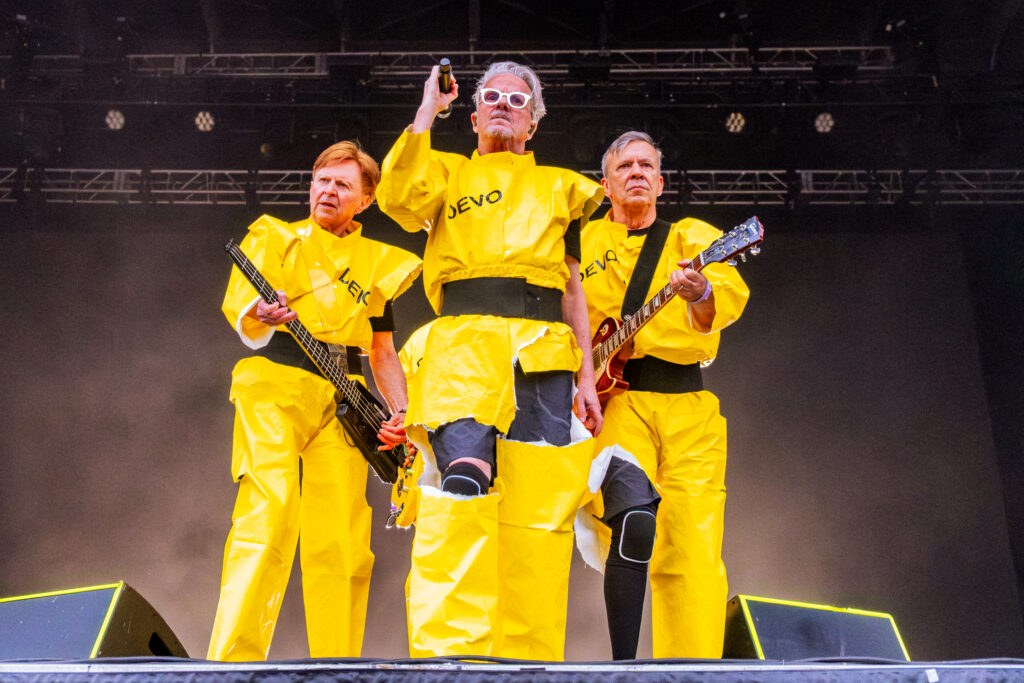
We watched music at that time turn into like two different things. All the Country Joe and the Fish, Bob Dylan and people that had messages, they all went quiet and music in the ’70s turned into corporate rock, like Kansas and Chicago and stuff like that. The politics behind it was, “I’m white, I’m a male, I’m misogynist. I’m a conspicuous consumer, and I’m proud of it.”
Maybe we should figure some other way to do things. I think my biggest disappointment [is] that greed became the politics that were the most successful on this planet. I mean communism at one time had an ideal to it that was kind of beautiful, in a way. You know? But communists are like just as big a bunch of capitalists as we are now. It’s like, that’s the virus. That’s the evil virus, is greed.
The other split in music, the other part of it went towards disco. And we love the sounds in disco, but disco, it had the dumbest lyrics. They were so dumb. I remember Jerry once saying to me, “You know, I feel like disco is like a pretty woman with no brain.” [Laughs.] The sum total of the set of lyrics would be, “I was born, I didn’t know why I was on this planet, and then I finally figured out why I’m here. I was just born to be alive, take up space, consume!” We thought, well, we’re doing something different, you know.
When disability yields creativity
CG: You’re still creating, constantly creating. I think you have an art exhibit right now, right, on the West Coast? So I wonder how, as a composer, as a visual artist, you’ve found you can embrace [technology] and not reject it.
MM: When I meet a child of a friend of mine that they may say, “Oh, my son has attention deficit” or something, I’m curious about these kids, and I’m interested in talking to them, because they have a unique viewpoint. And as an artist, I think that’s something that they could use to their advantage to take a whole ‘nother perspective on what’s going on around us, and they see it in a different way.
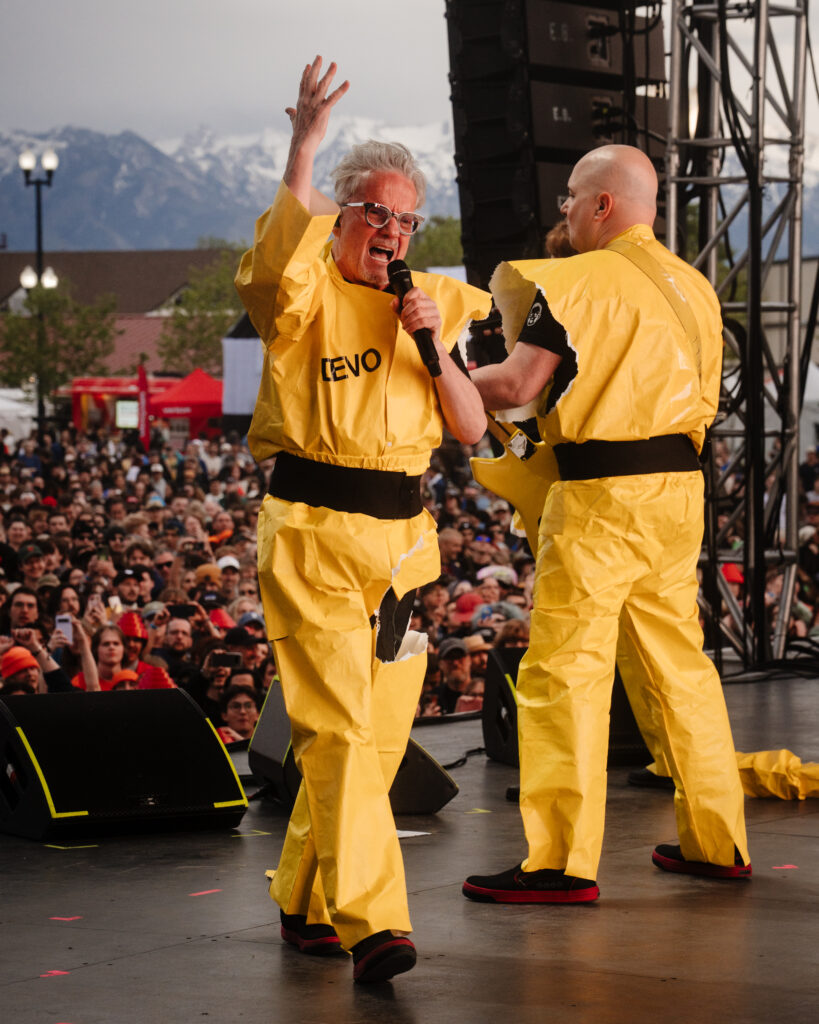
I had that, I had extreme myopia. I was born legally blind and nobody knew it till I was almost eight years old. I went through 1st and 2nd grade and kept getting reprimanded and then finally somebody said, “Hey, maybe we should check his eyes.” And then they did and they said, “Oh, he can’t see the big E on an eye chart beyond six inches.” And then I got my first pair of glasses and it was like this amazing, delightful thing that happened. I was so excited about it and and it made me want to be an artist even more. The next day I went back to school and I was drawing a picture of a tree that was in my front yard that I’d never seen it before. I’d only seen the part you run into when you’re playing and I saw the whole tree when I came home and I was so impressed. I was drawing one the next day and this teacher, who had been spanking me and disciplining me for the whole school year, she’s looking and she goes, “Mark, you draw trees better than me!” And that night I dreamt I was gonna be an artist. And so I was just turning eight when I already had committed myself to being an artist.
I still draw, I still write music. I think I became a composer, though, partly it was because of DEVO — we had this, you know, arc and then we signed a bad record deal, and it kind of slowed down. A friend of mine in this art community I hung out in, he said, “Hey Mark, you turned down scoring my film, but will you score my TV show?” And I go, “Score a TV show? I don’t know, let me try it.” And it was “Pee Wee’s Playhouse.” I got to write, like, an album’s worth of music in one day, and then record it the next day, and then put it in the mail on Thursday. Friday they mixed it into the show and Saturday we’d watch it on TV and then Monday they gave me another episode to write music for. I said, “I love this job.”
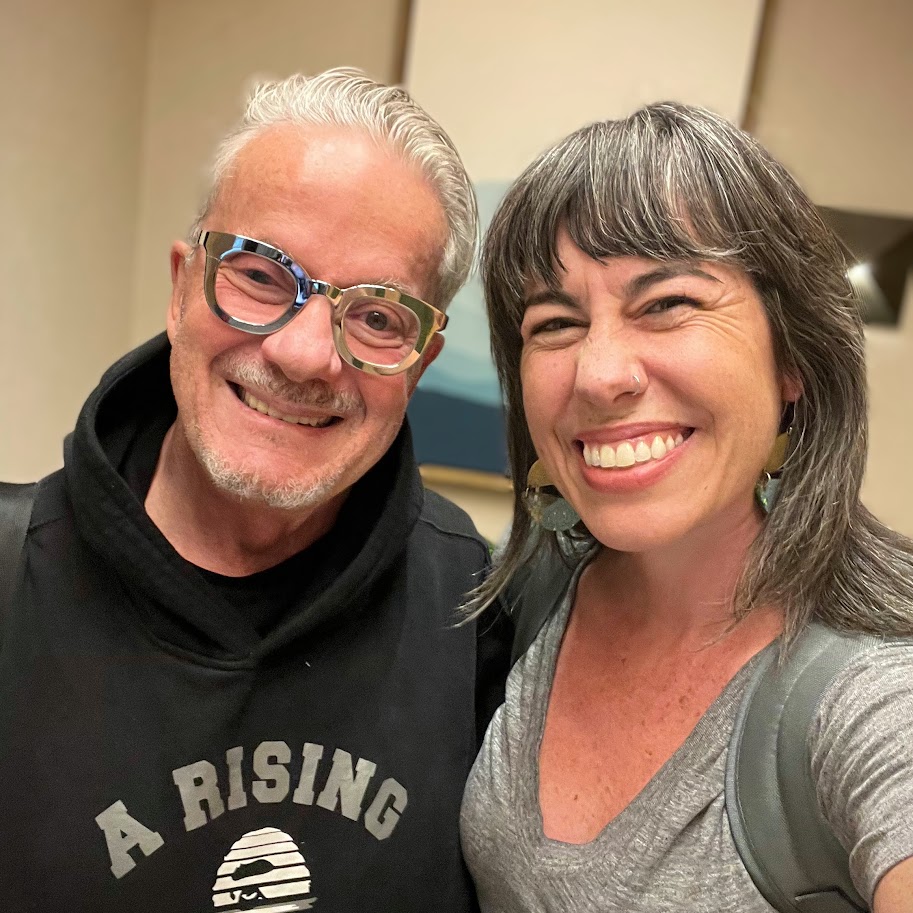
Part of my handicap of being blind when I was a kid, I think my mind was used to seeing blurs and things that you couldn’t define and trying to turn them into things. Five years ago, I lost vision in this eye through some freak accident…and so this eye now is kind of like in the same condition as my vision was when I was a kid. This one, I got cataract surgery like six years ago and now it’s more like some normal eye or something. So I got one of each. But I was looking at something the other day when I was home, I saw a movement and I turned it into one of my wife’s dogs, and it wasn’t, it was something else… That’s how it was when I was a kid. My brain was trying to interpret things all the time. So I think that’s part of why I’m an artist.
I draw every day. I did these on an airplane today. [Flips through hand-drawn postcards.] And I like calligraphy, so I’m kind of fascinated with Korean right now.

